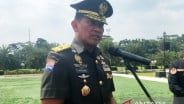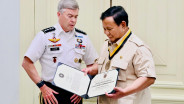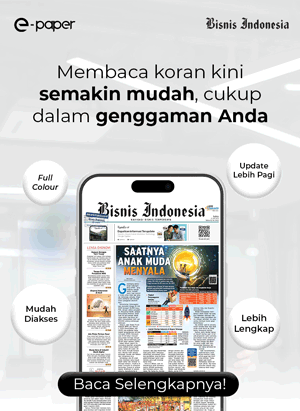JAKARTA: Presiden Susilo Bambang Yudhoyono mendapatkan kesempatan terhormat memberikan pidato di UNESCO House, Paris. Presiden Yudhoyono dalam pidatonya mengangkat pengalaman Indonesia dengan semboyan Bhineka Tunggal Ika yang bisa menjadi contoh bagi pengembangan culture university.Presiden Yudhoyono mendapatkan kesempatan tersebut bersama Presiden Bulgaria Georgi Parpanov. Berikut ini salinan pidato resmi Presiden Yudhoyono:
UNESCO HOUSE, PARIS, 2 NOVEMBER 2011BismillahirrahmanirrahimAssalamu’alaikum Warahmatullahi WabarakatuhMay Peace Be Upon Us,Her Excellency Madam Katalin Bogyay , President of the 36th Session of the General Conference,Her Excellency Madam Eleonora Mitrofanova , Chairperson of the Executive Board,Her Excellency Madam Irina Bokova , Director-General of UNESCO,His Excellency Mr. Georgi Parvanov , President of Bulgaria, Excellencies,Distinguished delegates,I am honored to be here to address the 36th General Conference of UNESCO. I stand here before you representing a nation that proudly considers itself a bastion of multiculturalism. Indonesia, with over 300 ethnic groups, is arguably the world’s most ethnically diverse nation. Since independence, successive generations have passionately live by the motto Bhinneka Tunggal Ika - “unity in diversity”.Whether one comes from the largest Javanese ethnic group or the smaller Buginese or Acehnese ethnicity, everyone has equal rights, equal stake and equal ownership in the grand Indonesian family tree. Multiculturalism therefore is very much part of our national DNA, a formula for national survival, and a necessary pathway for future generations.Indonesia today is an archipelago of peace and tolerance. But this is not something that we take for granted. History is littered with examples of harmonious communities turned into sworn enemies overnight. As we step into the 21st century, managing diversity - in the midst of rapid modernization and globalization - remains for us a critical challenge today and for the future.And I believe this is also true for the rest of the community of nations.It is therefore timely that we gather today to mark the 10th Anniversary of the UNESCO Declaration on Cultural Diversity. This Declaration signifies our conviction that multiculturalism will be a driving force in the 21st Century, a benevolent creative force that will change and shape the international system.But this too is not a given. When I refer to culture, I refer not just to traditional customs and folklores, but also a whole system and sub-system of values and norms and mindset, wisdom, technology, way of being and doing. And because culture is something that belongs to the soul, when peoples and cultures interact – especially in such scale and speed – not everything will be smooth and happy. Sensitivities abound. Frictions can erupt. Sometimes, even conflict.So the question that looms large before us is this : how do we harness our rich cultural diversity to be a constructive force to foster a world of peace, justice and progress that we all yearn for ? How do we ensure that the promotion of cultural diversity lead to greater democracy and better protection of human rights, and to a better balance between freedom and tolerance ?It is a daunting task, but it is all the more relevant because the cultures of the world contain many powers. The power of life and love. The power to heal. The power to build and nurture. The power of survival. The power of posterity.With the wrong approach, cultures can divide; with the right approach, it can unite. And there are always surprising ways where cultural factors can hold the key to the solution : be they in conflict resolution, in climate change, in democracy, or in economic development. In climate change, for example, we in Indonesia found it prudent to go back to basic by “going green” and to intensify the protection of our rain forests, because our ancestors way of life has always revolved around the love for mother earth.In conflict resolution, we have promoted various forms of peaceful resolutions by strongly factoring in local cultural considerations, for example in Aceh and Papua, and in Poso.And in democracy, we have embarked on what some have called “the quiet revolution”, the most ambitious decentralization and local elections program that has transferred substantial political, economic and socio-cultural autonomy to the provinces and regents.Indeed, as Indonesia transforms into a vibrant democracy and emerging economy, we have found ever more that our rich culture is an indispensable asset. That is why my fellow Indonesians are very proud of the fact that in recent years, UNESCO has officially recognized several of Indonesia’s cultural icons in “the representative list of intangible cultural heritage” of the world, namely keris, wayang, batik, and angklung, after also designated the great Borobudur Temple Compounds, Prambanan Temple Compounds and the Sangiran Early Man Site, as the “world cultural heritage”. Through me, Indonesians would like to convey to UNESCO : THANK YOU, from the bottom of our hearts. Ladies and gentlemen,We mark the 10th anniversary of the Universal Declaration on Cultural Diversity in a time of change and anxiety in the international system. Outside the walls of this building, we see the onset of a new world, a world in uneasy process of rebirth. And in that new world, we see a rapid mental and political shifts taking place - changing markets, changing nations, and changing the international system.As the world unravels, one critical phenomenon stands out, one which is of relevance to both the developed and developing countries. It is called “confidence”. In much of Europe, and in many parts of the western world, there is a trend of declining confidence – some even call it a “crisis of confidence”. Governments are under severe pressures. Businesses are holding back. The youth are getting restless. Societies are gripped in anxiety and self-doubt about their future. People are embracing for short-term shocks, and shying away from long-term plans.Much of this problem of confidence stem from economic difficulties. When growth slows down, joblessness rise, and costs go up, people naturally become wary. They begin to belt up, spend less, and worry more.I raise this because – as empirical evidence suggests - declining confidence could potentially impact on the issue of identity. When people become insecure, there is a temptation to raise barriers and to increasingly ask “who are we ?” and “who are we becoming ?” – questions that have been raised by all societies for thousands of years, with different answers. In uneasy times, in the defense of such identity, there is greater potential for societies to become more exclusive and less tolerant culturally. My humble advise, for whatever its worth, is this : do not give in to such temptation. In fact, go the other way. In the face of difficult times, embrace openness and cultural diversity with greater determination. In the wake of growing pressures, find solutions by reaching out to one another. And in times of misfortune, be more kind and compassionate.This is what we did in Indonesia during the economic and political crisis in the late 1990’s. During that transition, we thoroughly reviewed our regional and ethnic policies with all our stakeholders, and made the necessary reforms to suit the new reality. And we made sure that our newfound democracy was responsive to the aspirations of our very diverse citizens.And in time, we in Indonesia overcame our crisis and our self-doubt and emerged to become the strong vibrant democracy that we are today. And not just in Indonesia, in many parts of the developing world, we see a different kind of phenomenon : a surge of confidence. To some degree, such surge of confidence stem from economic performance : high growth, rising middle-class, lesser poverty, corporate success, capital gains, expanding prosperity. This newfound confidence is a healthy trend, one which we should all try to nurture.But just as we ask the developed world not to succumb to restive nationalism, the developing world must also be careful that their newfound confidence does not spark ultra-nationalism, or arrogant nationalism. Just as in economics we expect the G20 to deal with financial crisis by avoiding protectionism, in the cultural sphere we also expect nations to avoid cultural exclusivism. There is always a risk when things are going too well, people tend to believe they are invincible, which can lead to inflated judgments. There is no need to exchange inferiority complex with superiority complex – neither of which serves any of us any good.Indeed, in addressing economic as well as cultural challenges, the remedy is the same : greater openness and more collaboration.Indeed, in the spirit of the Universal Declaration on Cultural Diversity, the challenge for our time is how to best promote and protect a healthy multiculturalism worldwide. As we look across the world today, we are so delighted that in east and west, in the north and the south, multiculturalism is fast becoming the new global PC, the new “politically correct”. All over the world, people are wearing their ethnic identity on their sleeves with pride. Being open to other cultures, and learning from them, is now generally seen as a formula for progress, and success. Diversity is increasingly seen as real assets, in politics and markets, in our schools and communities.Unfortunately, the rise of multiculturalism globally is also met with growing signs of intolerance - both in the west and east. There are new pockets of ethnic, racial and religious tensions. And this is not necessarily confined to the poor. Intolerance also emanates from parts of the middle class and the rich.I am realistic enough to admit that in our lifetime we will NOT totally rid the world of bigotry, prejudice, hatred, and conflict. But I am also pragmatic to believe that in our life time, we can make the forces of multiculturalism, moderation, and pluralism to be the mainstream of the world community.This is why multiculturalism should not stand alone, but should be coupled with a spirit of unity. It is not enough for cultures to occupy their rightful spaces in the socio-political stadium. When a sense of unity among cultures is lacking or missing, there will be an unhealthy disconnect among them, and multiculturalism becomes artificial or worse, conflict-bound.Thus, there must be cross-cultural efforts to respect and embrace one another as part of one big family. There must be genuine interest and sincere goodwill in cultural interactions– which form the basis of a culture of peace that is sorely needed in the international system.And this positive, united multiculturalism must be part of the new globalism that is now emerging. And as we all know, this new 21st century globalism will need plenty of new thinking, new ideas and new approaches, and even new courage, to tackle the momentous issues of our time - from climate change to extremism, from globalization to food security, from infectious diseases to growing inequity.With all these challenges, that is why I believe that to fulfill its promise, multiculturalism must also be coupled with meritocracy. Multiculturalism is about creating a world which thrives on diversity. Meritocracy is about ensuring a world driven by equal opportunity for all. This is critically important because we are likely to see an explosion of middle class around the world. In Asia alone for example, it is predicted that there will be 3 billion additional people joining the middle class by 2050. They will be educated, they will pay taxes, and have skills. They will have email accounts, bank accounts, and fanciful digital tools. And most importantly, they will be more – not less - proud of their heritage.If we combine multiculturalism with meritocracy, we can unleash enormous creative powers that will cure many of our troubles. This is true for both developed and developing world. For we now have a window of opportunity to forge a new perspective on the state of the world.I say this because in the 20th century, during the Cold War, we all lived under the dark cloud of what was called “peaceful coexistence”. Honestly, as a young military officer back then, I never liked that term. It was a passive gloomy term driven by fear of one towards others. The human race should aim for far more than just the lowest common denominator of aiming to co-exist. In the 21st century, with the bipolar world behind us and a multipolar world in the making, we have the opportunity to create a world marked by “synergized progress”. This means nations shall do more than just to “peacefully coexist” but we actually work together in synergy to achieve common progress. This world of “synergized progress” will be much more durable and dynamic than the fragile world of peaceful coexistence. And it would give ample space to all cultures of the world to flourish, because every nation will have the opportunity to bring their cultures, along with their ideas and products, to the international arena. This is actually what we are trying to do by working towards the ASEAN Community. We are intensifying efforts to attain the ASEAN Socio-Cultural Community, which is a vision of a healthy regionalism which draws strength from the region’s enormous diversity, both in terms of religion, race and ethnicity. We are convinced that in the Southeast Asia region characterized by immense cultural and religious diversity, the best vehicle for regional cooperation and for durable peace would be an open and inclusive approach towards cultural connections. We understand full well that there can be no durable ASEAN family without mutual respect for our cultural diversity.So, as we mark the Tenth Anniversary of the UNESCO Declaration of Cultural Diversity, we must look forward with renewed purpose. Societies have lived for too long under the divisive notion of “us and them”. It is time that we evolve a different approach. It is time we evolve “the new we”. That “new we” forces us to see bridges instead of divides; to prize our common future than lament our troubled past.That “new one” compels us to look at those who are different from us in a profoundly new way.That “new we” shall make all of us united in diversity.Let us work together to advance that “new we”, and thus remake the world anew.Thank youAssalamu’alaikum Warahmatullahi Wabarakatuh















